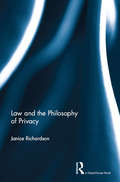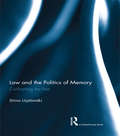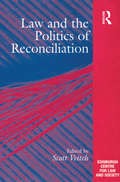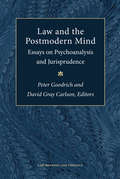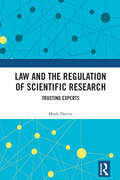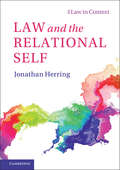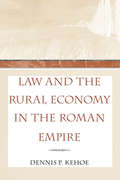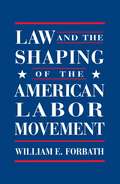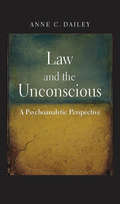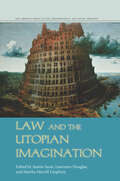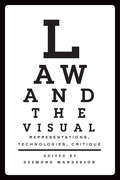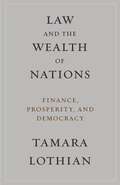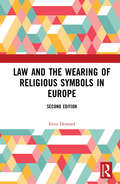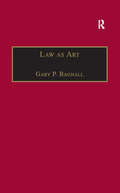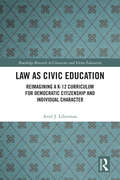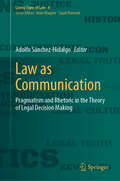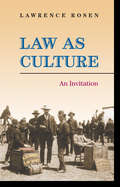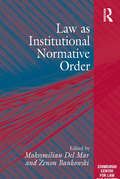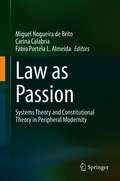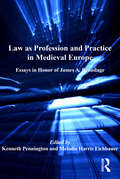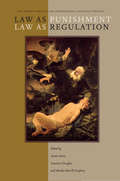- Table View
- List View
Law and the Philosophy of Privacy
by Janice RichardsonSituating privacy within the context of political philosophy, this book highlights the way in which struggles concerning the meaning of privacy have always been political. Different conceptions of privacy are here shown to involve diverse assumptions about ontology: our conceptions of self, culture, society and communication. Privacy theory’s debt to Locke, Kant or Mill, and what is at stake in their conceptual frameworks, is examined. The extent to which the term "privacy" has been used to the detriment of - and to create - weaker parties in marriage, in the workplace and now as citizens (or non-citizens) and consumers, as well as employees, is also demonstrated. In contrast, Janice Richardson pursues the relevance of Floridi’s philosophy of information, before turning to her application of Spinoza, the philosopher of communication, in order to outline a more useful framework through which to think about privacy today. The book will be of interest to those working in political philosophy, feminist philosophy, law, the philosophy of information, sociology, media, and cultural studies.
Law and the Politics of Memory: Confronting the Past
by Stiina LoytomakiLaw and the Politics of Memory: Confronting the Past examines law’s role as a tool of memory politics in the efforts of contemporary societies to work through the traumas of their past. Using the examples of French colonialism and Vichy, as well as addressing the politics of memory surrounding the Holocaust, communism and colonialism, this book provides a critical exploration of law’s role in ‘belated’ transitional justice contexts. The book examines how and why law has become so central in processes in which the past is constituted as a series of injustices that need to be rectified and can allegedly be repaired. As such, it explores different legal modalities in processes of working through the past; addressing the implications of regulating history and memory through legal categories and legislative acts, whilst exploring how trials, restitution cases, and memory laws manage to fulfil such varied expectations as clarifying truth, rendering homage to memory and reconciling societies. <P><P> Legal scholars, historians and political scientists, especially those working with transitional justice, history and memory politics in particular, will find this book a stimulating exploration of the specificity of law as an instrument and forum of the politics of memory.
Law and the Politics of Reconciliation (Edinburgh/glasgow Law And Society Ser.)
by Scott VeitchThis collection of essays by an international group of authors explores the ways in which law and legal institutions are used in countries coming to terms with traumatic pasts and, in some cases, traumatic presents. In putting to question what is often taken for granted in uncritical calls for reconciliation, it critically analyses and frequently challenges the political and legal assumptions underlying discourses of reconciliation. Drawing on a broad spectrum of disciplinary and interdisciplinary insights the authors examine how competing conceptions of law, time, and politics are deployed in social transformations and how pressing demands for reconstruction, reconciliation, and justice inform and respond to legal categories and their use of time. The book is genuinely interdisciplinary, drawing on work in politics, philosophy, theology, sociology and law. It will appeal to a wide audience of researchers and academics working in these areas.
Law and the Postmodern Mind: Essays on Psychoanalysis and Jurisprudence
by Peter Goodrich David Carlson GrayDavid Gray Carlson and Peter Goodrich argue that the postmodern legal mind can be characterized as having shifted the focus of legal analysis away from the modernist understanding of law as a system that is unitary and separate from other aspects of culture and society. In exploring the various "other dimensions" of law, scholars have developed alternative species of legal analysis and recognized the existence of different forms of law. Carlson and Goodrich assert that the postmodern legal mind introduced a series of "minor jurisprudences" or partial forms of legal knowledge, which both compete with and subvert the modernist conception of a unitary system of law. In doing so scholars from a variety of disciplines pursue the implications of applying the insights of their disciplines to law. Carlson and Goodrich have assembled in this volume essays from some of our leading thinkers that address what is arguably one of the most fundamental of interdisciplinary encounters, that of psychoanalysis and law. While psychoanalytic interpretations of law are by no means a novelty within common law jurisprudence, the extent and possibilities of the terrain opened up by psychoanalysis have yet to be extensively addressed. The intentional subject and "reasonable man" of law are disassembled in psychoanalysis to reveal a chaotic and irrational libidinal subject, a sexual being, a body and its drives. The focus of the present collection of essays is upon desire as an inner law, upon love as an interior idiom of legality, and represents a signficant and at times surprising development of the psychoanalytic analysis of legality.
Law and the Question of the Animal: A Critical Jurisprudence (Law, Justice and Ecology #1)
by Yoriko Otomo Ed MussawirThis book addresses the problem of ‘animal life’ in terms that go beyond the usual extension of liberal rights to animals. The discourse of animal rights is one that increasingly occupies the political, ethical and intellectual terrain of modern society. But, although the question of the status of animals holds an important place within a range of civil, political and technological disciplines, the issue of rights in relation to animals usually rehearses the familiar perspectives of legal, moral and humanist philosophy. ‘Animal law’ is fast becoming a topic of significant contemporary interest and discussion. This burgeoning interest has not, however, been matched by renewed inquiry into the jurisprudential frames and methods for the treatment of animals in law, nor the philosophical issue of the ‘human’ and the ‘animal’ that lies at law’s foundation. Responding to this interest, Law and the Question of the Animal: A Critical Jurisprudence brings together leading and emerging critical legal theorists to address the question of animality in relation to law’s foundations, practices and traditions of thought. In so doing, it engages a surprisingly underdeveloped aspect of the moral philosophies of animal rights, namely their juridical register and existence. How does ‘animal law’ alter our juridical image of personality or personhood? How do the technologies of law intersect with the technologies that invent, create and manage animal life? And how might the ethical, ontological and ceremonial relation between humans and animals be linked to a common source or experience of law?
Law and the Regulation of Scientific Research: Trusting Experts
by Mark DaviesScientific research is fundamental to addressing issues of great importance to the development of human knowledge. Scientific research fuels advances in medicine, technology and other areas important to society and has to be credible, trustworthy and able to command confidence in the face of inevitable uncertainties. Scientific researchers must be trusted and respected when they engage with knowledge acquisition and dissemination and as ethical guardians in their education and training roles of future generations of researchers. The core values of scientific research transcend disciplinary and national boundaries and approaches to the organisation and oversight of research systems can impact significantly upon the ethics and conduct of researchers. This book draws upon legal expertise to critically analyse issues of regulation, conduct and ethics at the important interface between scientific research and regulatory and legal environments. In so doing it aims to contribute important additional perspectives to the existing literature. Case studies are engaged with to assist with the critical analysis of the current position and the consideration of future possibilities. The book will be of interest to academics in the fields of science, law and policy; science and law students and scientific researchers at more advanced stages of their careers. Research professionals in government and the private sector and legal practitioners with interests in the regulation of research should also find the work of interest.
Law and the Relational Self (Law in Context)
by Jonathan HerringThis book promotes a relational understanding of the self. It explores how law can be transformed by focusing on the promotion and protection of caring relationships, rather than individual rights. This offers a radical and profound re-imagining of what law is about and what it should be trying to do. It moves from the theoretical into offering practical examples of how the law could be developed to enhance relationships, rather than undermine them.
Law and the Rural Economy in the Roman Empire
by Dennis P. KehoeThe economy of the Roman Empire was predominantly agrarian: Roman landowners, agricultural laborers, and small tenant farmers were highly dependent upon one another for assuring stability. By examining the property rights established by the Roman government, in particular the laws concerning land tenure and the contractual relationships between wealthy landowners and the tenant farmers to whom they leased their land, Dennis P. Kehoe is able to demonstrate how the state fostered economic development and who benefited the most. In this bold application of economic theory, Kehoe explores the relationship between Roman private law and the development of the Roman economy during a crucial period of the Roman Empire, from the second to the fourth century C.E. Kehoe is able to use the laws concerning land tenure, and the Roman government's enforcement of those laws, as a window through which to develop a more comprehensive view of the Roman economy. With its innovative application of the methodologies of law and economics and the New Institutional Economics Law and the Rural Economy in the Roman Empire is a groundbreaking addition to the study of the Roman economy.
Law and the Shaping of the American Labor Movement
by William E. ForbathWhy did American workers, unlike their European counterparts, fail to forge a class-based movement to pursue broad social reform? Was it simply that they lacked class consciousness and were more interested in personal mobility? In a richly detailed survey of labor law and labor history, William Forbath challenges this notion of American “individualism.” In fact, he argues, the nineteenth-century American labor movement was much like Europe’s labor movements in its social and political outlook, but in the decades around the turn of the century, the prevailing attitude of American trade unionists changed. Forbath shows that, over time, struggles with the courts and the legal order were crucial to reshaping labor’s outlook, driving the labor movement to temper its radical goals.
Law and the Social Sciences: Hart And Sartre On Revolution (Studies In The Social Sciences Ser. #6)
by Leon Lipson Stanton WheelerThe notion of law as a social phenomenon would have surprised educators and scholars a century ago. For them, law was a science and the library was the ultimate source of all legal knowledge. Our contemporary willingness to see law in a social context—reflecting social relations, for example, or precipitating social changes—is a relatively recent development, spurred during the last quarter century by the work of a generation of scholars (mostly social scientists and law professors) who believe the perspectives of the social sciences are essential to a better understanding of the law. Law and the Social Sciences provides a unique and authoritative assessment of modern sociolegal research. Its impressive range and depth, the centrality of its concerns, and the stature of its contributors all attest to the vitality of the law-and-society movement and the importance of interdisciplinary work in this field. Each chapter is both an exposition of its author’s point of view and a survey of the pertinent literature. In treating such topics as law and the economic order, legal systems of the world, the deterrence doctrine, and access to justice, the authors explore overlapping themes—the tension between public and private domains, between diffused and concentrated power, between the goals of uniformity and flexibility, between costs and benefits—that are significant to observers not only of our legal institutions but of other social systems as well.
Law and the Stranger
by Austin Sarat Lawrence Douglas Martha Merrill UmphreyThe six papers presented in this collection "explore the ways in which law, particularly liberal legal regimes, identifies and responds to strangers within and across their borders, both historically and in the present day," to quote the editors (all of Amherst College). Specifically, the papers explore and critique Immanuel Kant's ideas on neighborliness and hospitality in relation to contemporary transnational migration; the ways that the historic relative legal equality of citizens and aliens in the United States has been undermined in recent years by "war on terror" policies and curtailments of public assistance to immigrants; jurisdictional boundary-drawing in the Israeli trials of Azmi Bishara, a Palestinian citizen of Israel and Knesset member, and Marwan Barghouti, a member of the Palestinian Parliament, both tried for allegedly inciting terrorism and both rejecting the jurisdiction of the Israeli criminal courts over their cases; conflict of laws and the possibility of crafting hybrid rules that blend laws across normative boundaries; George Eliot's novel Daniel Deronda and the definition of rights and privileges of Jews, women, and illegitimate children in English law; and illiberalism and antilegalism in utopian literature. Annotation ©2011 Book News, Inc. , Portland, OR (booknews. com)
Law and the Technologies of the Twenty-First Century
by Roger Brownsword Morag GoodwinLaw and the Technologies of the Twenty-First Century provides a contextual account of the way in which law functions in a broader regulatory environment across different jurisdictions. It identifies and clearly structures the four key challenges that technology poses to regulatory efforts, distinguishing between technology as a regulatory target and tool, and guiding the reader through an emerging field that is subject to rapid change. By extensive use of examples and extracts from the texts and materials that form and shape the scholarly and public debates over technology regulation, it presents complex material in a stimulating and engaging manner. Co-authored by a leading scholar in the field with a scholar new to the area, it combines comprehensive knowledge of the field with a fresh approach. This is essential reading for students of law and technology, risk regulation, policy studies, and science and technology studies.
Law and the Unconscious: A Psychoanalytic Perspective
by Anne C. DaileyHow do we bring the law into line with people’s psychological experience? How can psychoanalysis help us understand irrational actions and bad choices? Our legal system relies on the idea that people act reasonably and of their own free will, yet some still commit crimes with a high likelihood of being caught, sign obviously one-sided contracts, or violate their own moral codes—behavior many would call fundamentally irrational. Anne Dailey shows that a psychoanalytic perspective grounded in solid clinical work can bring the law into line with the reality of psychological experience. Approaching contemporary legal debates with fresh insights, this original and powerful critique sheds new light on issues of overriding social importance, including false confessions, sexual consent, threats of violence, and criminal responsibility. By challenging basic legal assumptions with a nuanced and humane perspective, Dailey shows how psychoanalysis can further our legal system’s highest ideals of individual fairness and systemic justice.
Law and the Utopian Imagination
by Austin Sarat Lawrence Douglas Martha Merrill UmphreyLaw and the Utopian Imagination seeks to explore and resuscitate the notion of utopianism within current legal discourse. The idea of utopia has fascinated the imaginations of important thinkers for ages. And yet#151;who writes seriously on the idea of utopia today? The mid-century critique appears to have carried the day, and a belief in the very possibility of utopian achievements appears to have flagged in the face of a world marked by political instability, social upheaval, and dreary market realities. Instead of mapping out the contours of a familiar terrain, this book seeks to explore the possibilities of a productive engagement between the utopian and the legal imagination. The book asks: is it possible to re-imagine or revitalize the concept of utopia such that it can survive the terms of the mid-century liberal critique? Alternatively, is it possible to re-imagine the concept of utopia and the theory of liberal legality so as to dissolve the apparent antagonism between the two? In charting possible answers to these questions, the present volume hopes to revive interest in a vital topic of inquiry too long neglected by both social thinkers and legal scholars.
Law and the Visual: Transition, Transformation, Transmission
by Desmond MandersonIn Law and the Visual, leading legal theorists, art historians, and critics come together to present new work examining the intersection between legal and visual discourses. Proceeding chronologically, the volume offers leading analyses of the juncture between legal and visual culture as witnessed from the fifteenth to the twenty-first centuries. Editor Desmond Manderson provides a contextual introduction that draws out and articulates three central themes: visual representations of the law, visual technologies in the law, and aesthetic critiques of law. A ground breaking contribution to an increasingly vibrant field of inquiry, Law and the Visual will inform the debate on the relationship between legal and visual culture for years to come.
Law and the Wealth of Nations: Finance, Prosperity, and Democracy
by Tamara LothianEconomic stagnation, financial crisis, and increasing inequality have provoked worldwide debate about the reshaping of the market economy. But few are willing to risk a reorientation of dominant ideas and a reform of entrenched structures. Right-wing populism has stepped into the void created by a failure to imagine structural alternatives. Tamara Lothian offers a deeper view showing the path to the reconstruction of the economy in the service of both growth and inclusion. She probes the institutional innovations that would reignite economic growth by democratizing the market. Progressives have traditionally focused only on the demand side of the economy, abandoning the supply side to conservatives. Law and the Wealth of Nations offers a progressive approach to the supply side of the economy and proposes innovation in our fundamental economic arrangements.Lothian begins by exploring how finance can serve broad-based economic growth rather than serving only itself. She goes on to show how the reform of finance can lead into the democratization of the economy. How, she asks, can we ensure that the most advanced, knowledge-intensive practices of production spread throughout the economy rather than remaining in the hands of the entrepreneurial and technological elite? How can we anchor greater economic equality and empowerment in the way we organize the economy rather than just trying to diminish inequalities after the fact by progressive taxation and entitlements? How can we revise legal thought and economic theory to develop the intellectual equipment that these tasks require? Law and the Wealth of Nations will appeal to all who are searching for ways to think practically about change in our economic and political institutions.
Law and the Wearing of Religious Symbols in Europe
by Erica HowardWritten in accessible language, this book provides a comprehensive analysis of a topical subject that is being widely debated across Europe. The work presents an overview of emerging case law from the European Court of Human Rights and the Court of Justice of the European Union, as well as from national courts and equality bodies in European countries, on the wearing of religious symbols in public spaces. The author persuasively argues that bans on the wearing of religious symbols constitutes a breach of an individual’s human rights and contravene existing anti-discrimination legislation. Fully updated to take account of recent case law, this second edition has been expanded to consider bans in public spaces more generally, including employment, an area where some of the recent developments have taken place.
Law as Art (Applied Legal Philosophy #7)
by Gary P. BagnallLaw as Art presents a radical new legal theory, the Law as Art Hypothesis, which conceives law, not as a system of rules, but as a distinctive kind of art work. Law is differentiated as art by the Law as Compound Artistic Type Hypothesis, which uses the heuristic metaphor of the Operatic Music Drama, the most elementally complex compound art form, to develop an idea of legal art as a distinctive empowered text, supported by the arts of drama, painting, sculpture, dress-design, architecture, rhetoric and communication to form an elementally developed yet integrated unitary art work. Part I develops a new realist epistemology to support a contemporary action-type ontology of art, differentiated as art by virtue of its artistic value. Part II opens with a critical review of the arts in legal theory, before detailing the Law as Art and Law as Compound Artistic Type Hypothesis and locating them within contemporary scholarship. Legal philosophical implications are considered and there is an acronym key and glossary, bibliography and index.
Law as Civic Education: Reimagining a K-12 Curriculum for Democratic Citizenship and Individual Character (Routledge Research in Character and Virtue Education)
by Ariel LibermanIf a civic education is the essential foundation for a functioning, discursive democracy, how should it be taught? This book offers an innovative solution, arguing that far from abandoning the often- grand promise of civic education as a means of cultivating reasoning skills and democratic character, we should embrace it, and proposes a reimagined civic education based on teaching students in primary and secondary school law and legal reasoning.Drawing on a range of theoretical disciplines— law, philosophy, ethics, sociology, psychology, and moral educational and child development theory— this monograph justifies the benefits of law learning as a form of character and civic education and offers historical and comparative educational examples to show what is possible. It demonstrates how legal teaching can be incorporated into a K- 12 curriculum and argues that such training can be transformative, guiding students to become citizens capable of meeting the demands of democracy: citizens with stronger reasoning skills, a motivation to self- examine their values and beliefs and bring them into conversation with social values, and an ability to effectively navigate political institutions and participate in public discourse.This compelling and deeply original work will be of interest to scholars and educators in the fields of civic education, character and virtue education, legal studies, and philosophy of education.
Law as Communication: Pragmatism and Rhetoric in the Theory of Legal Decision Making (Living Signs of Law #6)
by Adolfo Sánchez-HidalgoThe Communicational Theory of Law (CTL) is a successful synthesis of the hermeneutic and analytical postulates, proceeding under the assumption that Law is the heritage of jurists and can be enriched by a rational and systematic reconstruction of the legal order. CTL offers an original perspective on the classic tension between normativity and institutionality, between Legal Theory and Legal Sociology, helping readers rediscover the value of Theory of Law in terms of explaining and advancing a range of legal functions. It wouldn&’t be saying too much to claim that through CTL, the contributions of the European philosophy of law from the 19th and 20th centuries (jurisprudence of concepts, legal sociology, legal positivism, institutionalism, etc.) can be reclaimed and now coordinated from a communicational and philosophy of language perspective, offering us a complete and useful Theory of Law. CTL does not avoid the problem of the idea of justice; rather, it confronts it by distinguishing between the Theory of Justice and ambital justice. As such, readers are equipped to verify the originality of the Theory of Legal Decision in the CTL framework and, thus, will find new tools for critically assessing the performance of courts and public authorities. This book details the epistemological presuppositions on which CTL is built, but also offers new lines of critical development, which reflect CTL&’s theoretical and philosophical potential. In the studies presented here, readers will find original answers to classic problems of the Theory of Law, together with examples of CTL&’s practical application to the great challenges of our time, such as interculturalism, legal AI, populist demagogy, the transparency of public powers, etc. – all without forgetting the challenges of the future of Law.
Law as Culture: An Invitation
by Lawrence RosenLaw is integral to culture, and culture to law. Often considered a distinctive domain with strange rules and stranger language, law is actually part of a culture's way of expressing its sense of the order of things. In Law as Culture, Lawrence Rosen invites readers to consider how the facts that are adduced in a legal forum connect to the ways in which facts are constructed in other areas of everyday life, how the processes of legal decision-making partake of the logic by which the culture as a whole is put together, and how courts, mediators, or social pressures fashion a sense of the world as consistent with common sense and social identity. While the book explores issues comparatively, in each instance it relates them to contemporary Western experience. The development of the jury and Continental legal proceedings thus becomes a story of the development of Western ideas of the person and time; African mediation techniques become tests for the style and success of similar efforts in America and Europe; the assertion that one's culture should be considered as an excuse for a crime becomes a challenge to the relation of cultural norms and cultural diversity. Throughout the book, the reader is invited to approach law afresh, as a realm that is integral to every culture and as a window into the nature of culture itself.
Law as Institutional Normative Order: Essays In Honour Of Sir Neil Maccormick (Edinburgh/glasgow Law And Society Ser.)
by Maksymilian Del MarMacCormick's `Institutions of Law' is the culmination of a lifetime's work in legal theory by one of the world's most respected legal theorists. Featuring an impressive collection of contributions from well-known legal theorists from around the world, all of whom are familiar with MacCormick’s work, this collection provides a cutting edge account of the book’s significance.
Law as Passion: Systems Theory and Constitutional Theory in Peripheral Modernity
by Miguel Nogueira de Brito Carina Calabria Fábio Portela L. AlmeidaInspired by the works of Professor Marcelo Neves, in this book colleagues come together to explore how their research has been influenced by non-European and post-colonial approaches. With a foreword by Karl-Heinz Ladeur, it features essays written by leading scholars in the fields of sociology of law and constitutional theory – including Hauke Brunkhorst, Darío Rodrígues, Kimmo Nuotio and Pablo Holmes.The content is divided into four sections, the first of which, “Law, State, and Global Crisis,” covers topics related to the modern constitutional state, the crisis of global capitalism, and the global rule of law. The second, “Symbolic Constitutionalization,” analyzes challenges to constitutionalism in the “Peripheral Modernity.” The authors in the third section examine how the concept of “Transconstitutionalism” can shed new light on contemporary debates concerning global public law. In turn, the last section of the book, “Systems Theory and Public Law,” addresses systems theory issues in the fields of legal history and administrative law.The book presents a relevant and original discussion encompassing such diverse fields as constitutional theory, international law, systems theory, and sociology of constitutions.
Law as Profession and Practice in Medieval Europe: Essays in Honor of James A. Brundage
by Kenneth Pennington Melodie Harris EichbauerThis volume brings together papers by a group of scholars, distinguished in their own right, in honour of James Brundage. The essays are organised into four sections, each corresponding to an important focus of Brundage's scholarly work. The first section explores the connection between the development of medieval legal and constitutional thought. Thomas Izbicki, Kenneth Pennington, and Charles Reid, Jr. explore various aspects of the jurisprudence of the Ius commune, while James Powell, Michael Gervers and Nicole Hamonic, Olivia Robinson, and Elizabeth Makowski examine how that jurisprudence was applied to various medieval institutions. Brian Tierney and James Muldoon conclude this section by demonstrating two important points: modern ideas of consent in the political sphere and fundamental principles of international law attributed to sixteenth century jurists like Hugo Grotius have deep roots in medieval jurisprudential thought. Patrick Zutshi, R. H. Helmholz, Peter Landau, Marjorie Chibnall, and Edward Peters have written essays that augment Brundage's work on the growth of the legal profession and how traces of a legal education began to emerge in many diverse arenas. The influence of legal thinking on marriage and sexuality was another aspect of Brundage's broad interests. In the third section Richard Kay, Charles Donahue, Jr., and Glenn Olsen explore the intersection of law and marriage and the interplay of legal thought on a central institution of Christian society. The contributions of Jonathan Riley-Smith and Robert Somerville in the fourth section round-out the volume and are devoted to Brundage's path-breaking work on medieval law and the crusading movement. The volume also includes a comprehensive bibliography of Brundage's work.
Law as Punishment / Law as Regulation
by Austin Sarat Lawrence Douglas Martha Merrill UmphreyLaw depends on various modes of classification. How an act or a person is classified may be crucial in determining the rights obtained, the procedures employed, and what understandings get attached to the act or person. Critiques of law often reveal how arbitrary its classificatory acts are, but no one doubts their power and consequence. This crucial new book considers the problem of law's physical control of persons and the ways in which this control illuminates competing visions of the law: as both a tool of regulation and an instrument of coercion or punishment. It examines various instances of punishment and regulation to illustrate points of overlap and difference between them, and captures the lived experience of the state's enterprise of subjecting human conduct to the governance of rules. Ultimately, the essays call into question the adequacy of a view of punishment and/or regulation that neglects the perspectives of those who are at the receiving end of these exercises of state power.
